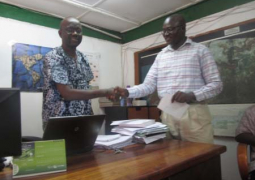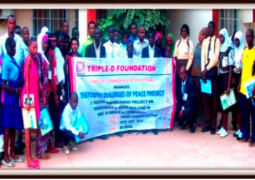The need to protect our natural resources, particularly fish in our territorial waters and in the River Gambia, is very essential.
Illegal fishing undermines the sustainable use of fishery resources globally, and contributes to the depletion of fish stocks.
We sincerely agree with Hon. Lamin Kaba Bajo, The Gambia's Minister of Fisheries and Water Resources, when he called for sub-regional cooperation in the fight against illegal fishing, and his assertion that this is the only viable alternative in ensuring the sustainability of fishing stock in the sub-region.
The Minister made this call on Monday, on the occasion marking the 25th anniversary of the Sub-Regional Fisheries Commission (SRFC).
The theme for this year's celebration was "Fight Against Illegal Fishing: Sub-regional Cooperation for Better Synergy of Action".
There is definitely the need for us to control and secure our territorial waters so as to enable us make maximum use of our marine resources like fish.
Regular monitoring and joint surveillance activities by the member states of the commission, as agreed on 1st September 1993 in Guinea Conakry, can also be of a big help when fully implemented.
Bajo was right when he said that fish and fishermen regularly cross national boundaries; therefore sub-regional cooperation is the only alternative to ensure sustainability of resources.
Unreported and unregulated fishing is estimated at over 50 percent of catch value for certain countries of the sub-Saharan Africa, and nearly $100 million is lost in revenues for the coastal states of
Because of their sizes and sophisticated method of operations, the damage caused by illegal fishing on the marine environment and fishery resources takes several years to recover.
The effects of illegal fishing are serious and require concerted efforts to combat the menace.
According to Bajo, fisheries resources are a regional public asset. It is important, therefore, that the member states of the Sub-Regional Fisheries Commission (SRFC), an intergovernmental organisation created on 29 March 1985 by convention, should work towards the objectives of the commission, and ensure the improvement of the framework for sustainable management of fisheries resources.
The Sub-Regional Fisheries Commission should foster international cooperation between states to improve the framework for sustainable management of fisheries resources.
We should also harmonise national policies on preservation, conservation and exploitation of fisheries resources, and strengthen cooperation for the benefit and well-being of the population.
As we mark the 25th anniversary of the sub-regional fisheries commission there is need for us in the sub-regional bloc to evaluate the progress registered so far, and spot out the challenges and map out the way forward.
We need to further strengthen our cooperation for the sustainable exploitation of our fisheries resources.




